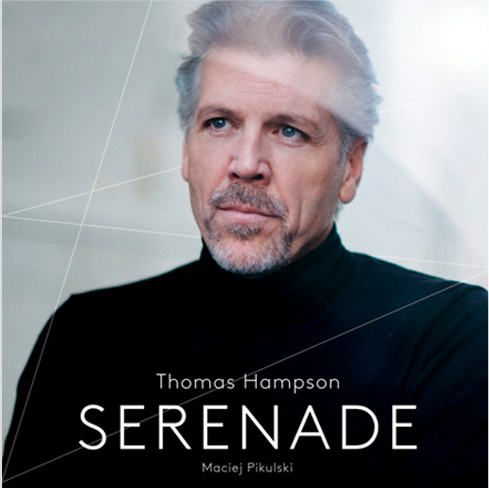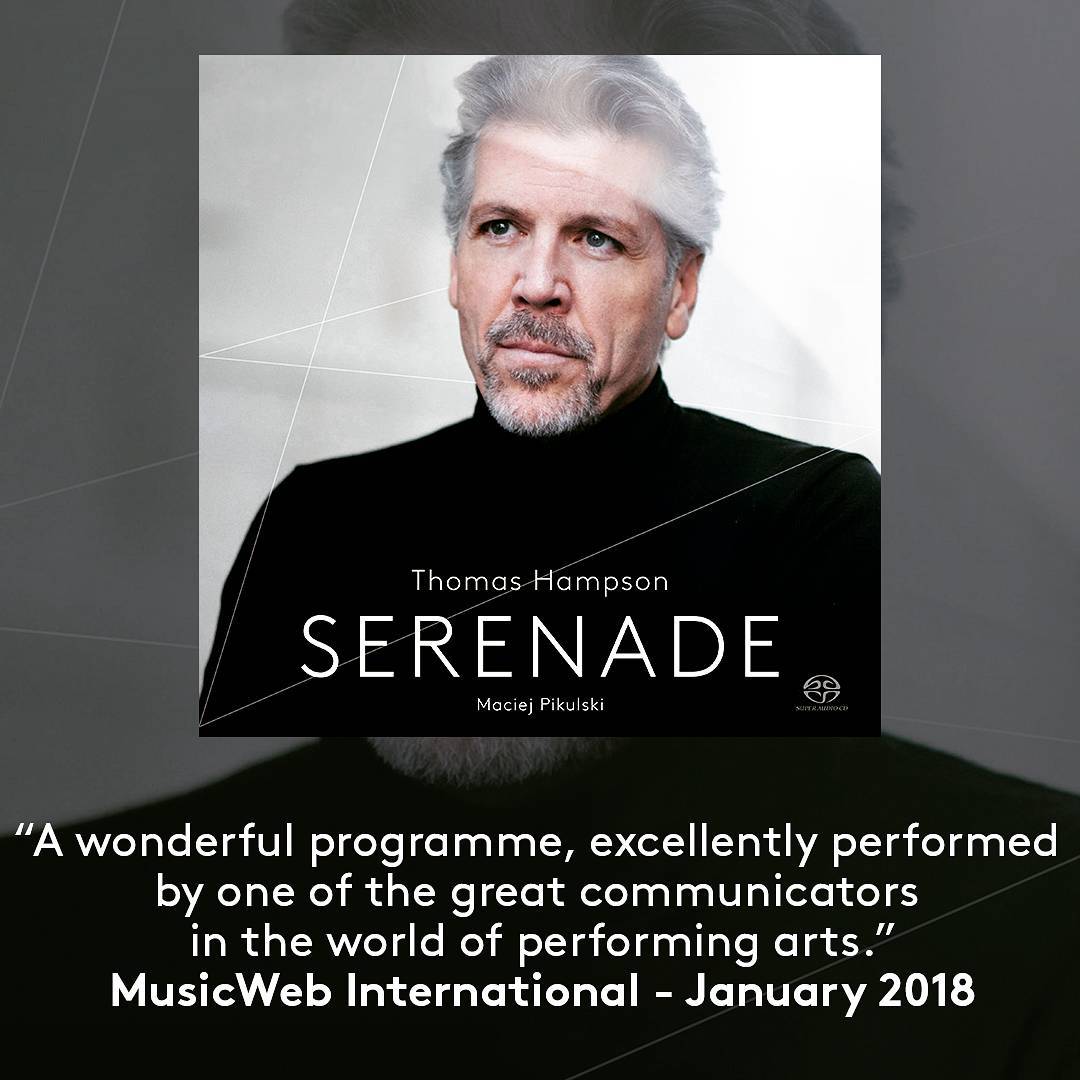Serenade
Buy Online

The acclaimed American baritone Thomas Hampson lovingly showcases the riches of French salon music for Pentatone in this irresistible survey of mélodies françaises, from the finesse of Gounod and Bizet to the iridescent harmonies of Chausson and Massenet.
Conceived for the intimate environment of the Parisian salon, these composers honed their skills to produce songs which are sophisticated, superbly crafted and laced with drama, irony and surprise. Always a delight, these songs palpably caress the listener with their beautifully contrived melodies and exquisitely refined harmonies, particularly evident in the plaintive, haunting songs of Ernest Chausson and Jules Massenet. Gallic wit and verbal dexterity is provided in the famous Danse Macabre of Camille Saint-Saëns, Emmanuel Chabrier’s Villanelle des petits canards, and the charming Sérénade and Ô ma belle rebelle by Charles Gounod. It’s a fascinating survey brought vividly to life in these compelling performances in pristine multi-channel sound.
Thomas Hampson is one of the today’s most respected and innovative musicians. With a repertoire of more than 80 operatic roles he has a discography comprising over 170 albums (including multiple nominations and winners of the Grammy Award, Edison Award and the Grand Prix du Disque). In this first release for Pentatone, he is joined by the Polish pianist Maciej Pikulski who combines a busy career as a soloist, chamber music player and accompanist.
Mr. Hampson’s acclaimed portrayals of iconic roles in French operatic works have spanned the duration of his singular international career. A longtime champion of French repertoire, he has starred in the title roles of Chausson’s Le roi Arthus at Opéra National de Paris; Massenet’s Werther (baritone version) at The Metropolitan Opera and Théâtre National du Châtelet; Massenet’s Thaïs (Athanaël) at Lyric Opera of Chicago and The Metropolitan Opera; Offenbach’s Les Contes d’Hoffmann (Four Villains) at the Royal Opera House – Covent Garden; and Thomas’ Hamlet at the Théâtre National du Châtelet. He has also performed in Massenet’s Manon (Lescaut), Gounod’s Faust (Valentin), Berlioz’ Les Troyens (Chorèbe), and Poulenc’s Les mamelles de Tirésias (Gendarme). Additionally, Hampson has been featured on critically lauded recordings of Faust, Les Contes d’Hoffmann, Thaïs, and Werther. Mr. Hampson carries the title of Commandeur dans l’Ordre des Arts et des Lettres of the Republic of France.
With “Serenade,” his first album exclusively dedicated to French song, Mr. Hampson brings his passion for works by French opera composers to the Pentatone label. Curated with the French Literature scholar Sylvain Fort and in a first collaboration with the Polish pianist Maciej Pikulski, the track listing includes romantic and introspective as well as humorous selections by Bizet, Chabrier, Chausson, Gounod, Magnard, Massenet, and Saint-Saëns, featuring texts written by some of France’s most revered writers including Victor Hugo, Paul Verlaine, Rosemonde Gérard, and others.
This recording is available exclusively from Pentatone’s website.
Thomas Hampson, baritone
Maciej Pikulski, piano
Track listing:
Charles Gounod (1818 – 1893)
1: Sérénade (V. Hugo)
2: Ô ma belle rebelle (A. de Baïf)
3: La Chanson du pêcheur (T. Gautier)
Georges Bizet (1838 – 1875)
4: Pastorale (J.-F. Regnard)
5: La Coccinelle (V. Hugo)
6: La Chanson du fou (V. Hugo)
Giacomo Meyerbeer (1791 – 1864)
7: Sicilienne (F. Méry)
Emmanuel Chabrier (1841 – 1894)
8: La Villanelle des petits canards (R. Gérard)
Ernest Chausson (1855 – 1899)
9: Chevalier Malheur (P. Verlaine)
10: Cantique à l’épouse (A. Jounet)
11: Le Temps des lilas (M. Bouchor)
Jules Massenet (1842 – 1912)
12: Les Yeux clos (G. Buchillot)
13: Heure Vécue (M. Jacquet)
Camille Saint-Saëns (1835 – 1921)
14: Le pas d’armes du Roi Jean (V. Hugo)
15: Danse macabre (H. Cazalis)
16: Si vous n’avez rien à me dire (V. Hugo)
Albéric Magnard (1865 – 1914)
17: Les Roses de l’amour (A. Magnard)
Reviews:
“Este recital es como un postre exquisito, mejor dicho, un postre exquisitamente francés. Postre para el que lo escucha y postre para sus intérpretes porque el placer que emana del veterano Thomas Hampson y su espléndido pianista – Maciej Pikulski – en cada canción lo corrobora sin vuelta de hoja. Y ese placer se contagia al oyente. Como un escaparate de tentadora patisserie con delicadezas a cual mas deliciosa. La elección del programa es minuciosa, irreprochable así como el pianista que se ciñe a la imaginación de su cantante y cuando debe, logra volar por si solo. Ambos se sacan chispas; si, chispeantes, efervescentes, rebosantes del obligado pero elusivo charme francés.”
Sebastián Spreng – Miami Clásica
“Profond, tout autant que doux comme du velours dans toute son étendue, le baryton de Thomas Hampson brille de mille feux, également dans des mélodies plus légères, comme La Coccinelle de Georges Bizet ou La Villanelle des petits canards d’Emmanuel Chabrier, pour lesquelles l’artiste émerveille non seulement par le timbre de sa voix, mais aussi par sa prononciation, l’articulation, ainsi que les nuances ; celles-ci, bien que sans aucun doute bien travaillées, paraissent pourtant si naturelles.”
Maciej Chiżyński – ResMusica
“Thomas Hampson is a marvel for his breadth of repertoire and constant means of expanding his artistry. His latest album, accompanied by Maciej Pikulski, is a fascinating exploration of French music from some of the most recognized French composers, including Gounod, Bizet, Meyerbeer, among others. Chances are you are not familiar with most of the pieces on the album, making the exploration of these great characters all the more fascinating.”
David Salazar – Operawire
“Selbst in der allergrößten Emphase von Massenets Werther oder des von der Kurtisane Thaïs bezwungenen Mönchs Athanael wahrt Thomas Hampson immer die Gesetze des musikalischen Salons: Noblesse in Momenten größter Sinnlichkeit und Leidenschaft in der Rhetorik. Deshalb ist diese Sammlung nur dem Titel nach eine „Serenade“. Camille Saint-Saëns‘ Vokalpoem „Danse macabre“ offenbart die Themen, idyllische Betrachtung maskiert das Verletztsein und die Dämonen des eigenen Inneren. Maciej Pikulski bringt Thomas Hampson mit betörenden Herbstklängen noch mehr zum Schweben. Es scheint, dass gerade durch die reife Gestaltung und das Verfließen der Harmonien von Instrument und Stimme jenes üppige Betören zur höchsten Entfaltung kommt, die das eigentliche Wesen der französischen „Mélodies“ ist: Vollendung und Verheißung im genüsslichem Einklang einer blauen Stunde, die sich in die Erinnerung eingräbt.”
Roland H. Dippel – Concerti
“Bien sûr, le temps est passé sur la voix du grand baryton sans toutefois faire subir ses outrages. Même si l’on avoue être moins touché par l’usage de la voix de tête, l’on admire la souplesse, le velouté et des aigus toujours aussi percutants (comme dans l’impressionnant « Le pas d’armes du Roi Jean » de Saint-Saëns). Le timbre garde cette incroyable présence qui permet au grand artiste d’habiter et de vivre chaque poème signé Théophile Gautier, Paul Verlaine ou Victor Hugo. La notice du livret de Sylvain Fort est un modèle d’érudition et de simplicité qui nous permet de nous fondre un peu plus dans l’atmosphère des salons.”
Hugues Rameau-Crays – Classique c’est cool!
“Poor baritone – the undisputed “viola of voices.” You see, among orchestral instruments, the violas get no respect. All the best jokes about musical instruments start with something like this: “What do you call 100 violas at the bottom of the ocean….” Seemingly, baritones get the same dismissive treatment. You’ve heard the Three Tenors, you know of the Celtic Tenors. There are superstar sopranos, diva sopranos – even an occasional mezzo star (Magdalena Kožená, Frederica von Stade and many others). But when, oh when, have you heard about a baritone superstar? A part of this neglect is rooted in the repertoire – baritones are usually the villains, scoundrels, humourless fathers or sour priests. But the true mystery to me is why a baritone (one of the loveliest voices you are likely to hear, and for me THE best voice for chanson, lieder and any other voice-and-piano music) has never reached the levels of adoration that other voices have.
Here to prove my point, two gentlemen poles apart in their careers. Thomas Hampson, arguably the “old guard” baritone, with several decades, and some 170 CDs to his name, is pitted against Brian Mulligan, a young and already accomplished graduate of the Juilliard School, here making his recording debut. Even their choice of music underlines the elegant divergence in their approaches: Hampson recorded his first record exclusively dedicated to French songs by opera composers, while Mulligan chose new vocal works by the American, Dominick Argento. Both are passionate, lyrical, thoughtful singers. Both fully understand the works they sing – no empty sound-making typical of some sopranos here. Both have the benefit of intelligent accompaniment by great piano players: Hampson with the phenomenal Maciej Pikulski, and Mulligan with the equally redoubtable Timothy Long. So maybe the recording quality will give one of them an edge? Alas, the PentaTone transparent recording is matched here by the more present Naxos studio job – both excellent. So the contest is a complete draw, as both singers are wonderful, unabashed, triumphant and resounding baritones!
The king of voices (in my small universe) proves again its power and beauty, showcased by both a seasoned and a novice singer, delivering the most satisfying vocal music of the past and the present and leaving the listener with an urgent need to hear more. Now, about those violas…”
Robert Tomas – The Whole Note
